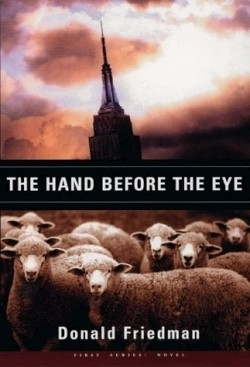
The Hand Before the Eye
“Just as the hand, held before the eye, can hide the tallest mountain, so the routine of everyday life can keep us from seeing the vast radiance of and the secret wonders that fill the world.” Eighteenth century, Hasidic.
Manhattan attorney David Farbman dreams of being a farmer. Disillusioned with the practice of law, he’s tired of struggling through the firm’s financial problems; and he’s tired of his floundering, sexless marriage. A small spark, however, is lit in Farbman when he attends a funeral and meets Leah Stein, who invites Farbman to a religious retreat. The Hasidic rabbi leading the group predicts that Farbman will experience a flash of insight during the weekend, but cautions that “for true repentance there must be change” a baal teshuva. Farbman indeed has a “transcendental experience,” and also spends an afternoon of lusty, passionate sex with Leah. Although Leah isn’t interested in pursuing a long-term romance with Farbman, he remains attracted to her and relies upon her as a source of “grounding,” inspired by her devotion to Judaism.
At this point, Farbman’s wife Ann Marie discovers she has a malignant tumor. Farbman takes time from his practice to provide additional support for her and their two children. Just as Farbman begins to think he has salvaged his marriage, Ann Marie receives compromising photos of her husband with a female attorney. She sues for divorce. Farbman’s downward spiral begins anew, exacerbated by major financial setbacks at the office. All of this drives him to the brink of suicide. At the last moment, his self-destruction is prevented by a phone call from Leah. He is drawn back into the world of religious philosophy, and works to reclaim himself. When he accepts a farm as payment for a legal debt, he finally begins to realize his long held dream of being a simple farmer. Leah, apparently has a baal teshuva of her own and decides to share his life down on the farm.
Friedman’s characters are nicely rounded and even likeable despite their flaws. The crisp dialogue builds momentum well as Farbman grapples with “the meaning of life” themes of the story. Friedman treats the religious material with respect as he explores the thought-provoking aspects concerning the role of doctrine in everyday life. (December, 1999)
Reviewed by
Jill R. Hughes
Disclosure: This article is not an endorsement, but a review. The publisher of this book provided free copies of the book to have their book reviewed by a professional reviewer. No fee was paid by the publisher for this review. Foreword Reviews only recommends books that we love. Foreword Magazine, Inc. is disclosing this in accordance with the Federal Trade Commission’s 16 CFR, Part 255.
